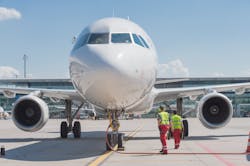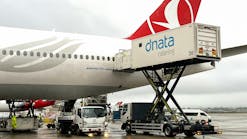When is it Best to Outsource Ground Handling?
The outsourcing of ground handling is a common occurrence at today’s airports. The practice is far from simple, though, as the wide variety of tasks can range from aircraft cleaning and maintenance to fueling, baggage handling, deicing and even passenger check-in. Additional staff, security clearances and physical space for both people and equipment are challenges to airports that outsource ground handling – as is maintaining a consistent level of customer service for passengers.
Executives at McCarran International Airport (LAS) in Las Vegas, have addressed this through a request for quotation (RFQ) process, limiting the number of ground handling providers, as well as setting guidelines that mutually benefit all parties: airport, airline and ground handler.
“For any new airline, it’s an easy start-up process,” says Phillip A. Detmer, aviation affairs manager at LAS. “The airline chooses one of the ground handlers and then works directly with that service provider to determine their needs. With this arrangement the airport doesn’t require a separate operating agreement with the airline, and all billing can go through the ground handler.”
Shopping Around
Two days before Christmas in 2013, worldwide ground handling company Swissport finalized its acquisition of Servisair, another popular ramp, passenger and cargo handling name in the industry. Together, they created a cargo handling giant, as Servisair had operations at 175 airports alone. Today, Swissport is active in 48 countries and 280 locations. This merger was important to the management at LAS, who were left with one ground handling option to offer airline tenants.
This proved to be a problem to the airlines at LAS, who asked for competitive shopping for their ground handling needs, in order to see if they were getting a good deal or not. An RFQ was drawn up and two additional providers (ASIG and EVO Jet Services) were chosen to fill the spots by a panel that included several airline representatives. The evaluation criteria included topics such as:
- Qualifications and experience (must have a minimum of three continuous years of experience within the past five years).
- Identification and experience of key employees, and if a local office exists.
- Customer service (complete plan for service, operational policies, employee practices and appearance, staffing plan, equipment and safety measures, handling complaints).
- Employee benefits.
- Financial and business capabilities.
Christine Crews is the public information administrator at LAS, which is owned and operated by the Clark County Department of Aviation. She says that when a new airline (such as their most recent, China’s Hainan Airlines) needs to staff ground handlers, but is only flying to Las Vegas two or three times per week, outsourcing allows for full-time employees and consistency in staffing.
Conversely, Southwest lands a flight every 15 minutes at LAS, she says, offering up the market-leader as an example of an air carrier that uses its own employees for ground handling.
“The third-party ground handlers here have a full-time staff that services multiple airlines,” Crews explains. “If you offer someone a position in which they may only be working a few hours a day for the three days a week that an international carrier has service in and out of Las Vegas, it makes it really hard to retain those employees. Most people are looking for full-time work and a living wage.”
She says that this setup provides less turnover, a better workforce and sustainability all around.
Contract Terms
When it comes to ground support contracts, Jeff Davis, general manager at Wisconsin Aviation, says vendors shouldn’t be afraid to negotiate, especially if their airline clients have a standard contract for ground handling services.
Wisconsin Aviation is a full-service provider of general aviation services including air charter, flight training, aircraft rental, aircraft sales and management, maintenance, avionics, interiors and line services. He explains that both sides must gain value from the relationship, while understanding the airline needs to save money and the provider needs to make a profit. He says contracts with ground handling providers should include what happens if a delayed flight has a labor force waiting on it, or additional equipment is needed last minute.
Davis says he can’t speak for the industry entirely, but explains this is a best practice his team uses.
“The airline will send their boilerplate contract, which is a great foundation, but you really need to go through with a magnifying glass and say if you can or can’t do something, and certainly look closely at the insurance requirements,” he says.
When it comes to liabilities, Davis says the following questions must be answered in a contract:
- If an aircraft is damaged during ground handling, what is a third-party service provider liable for?
- Is a ground service provider liable for the repair in addition to the downtime of the aircraft?
- Is a ground service provider responsible for the loss of revenue?
- If the value of the aircraft is diminished, is the service provider liable for that?
Davis says these things will depend on the agreement determined by both parties, but feels the ground handlers “should have some skin in the game.” He says only then do both groups have equal weight in keeping operations running smoothly.
McCarran Airport’s Detmer says the ground handlers at LAS have 10-year agreements and are allowed to subcontract no more than 25 percent of their total services. This is limited as well, to aircraft maintenance, ground support equipment maintenance, aircraft fueling, ground support equipment fueling, catering and wheelchair services.
“We recognize that there are some services they may need to subcontract, and we give them that flexibility,” adds Crews of LAS.
Most often, Detmer says, these subcontractors are established vendors and must be approved by the airline(s) the ground support provider is working for.
Challenges
“Labor is an airline’s largest expense,” says Wisconsin Aviation’s Davis. “A lot of people think it’s fuel and fuel is barely half of what the average labor expense is.”
He says he can see how it can be a lot more cost effective for an airline to contract out its above- and below-wing services, even ticket countering and ramp handling. Dane County Regional Airport in Madison, WI, is considered a small hub and Wisconsin Aviation is one of the ground handling providers at this location, which is ranked as the third largest full-time employer in the county.
Davis says he’s seen ground handlers try to “bare bones” their staff over the years, which brings on a host of problems, the first being safety of the ground handlers.
“Some try and get their revenue per the contract no matter what, and look where to cut,” he says. “There should be a good, written contract.”
Another challenge to outsourcing ground handling is equipment costs. McCarran Airport’s Crews says it doesn’t make sense for an airport the size of LAS to have the huge variety of equipment on hand that would be needed for the wide range of aircraft which fly in each day.
Davis says ground handlers can buy top-of-the-line equipment or purchase used items to just get by – another reason a written contract is essential. LAS’s RFQ specifies what services must be provided at a minimum, but also requires a list of make, model and year of each equipment piece.
“Safety also depends on how often the airline sends someone to check on their vendor,” Davis adds. “They need to hire people they can trust and are going to get the job done.”
When it comes down to it, Crews says that “if you’ve seen one airport, you’ve seen one airport.” All these professionals agree that each airport and airline will have different requirements and needs when it comes to ground handling. Plane size, flight schedules and equipment are just some factors in this ever-changing industry.
Crews says that LAS is unique in that it is a 100 percent common-use operation, meaning that the airport retains rights to all gates and infrastructure as owner/operator and then space and resources are leased out to tenants. As the eighth busiest airport in North America, its experience won’t be the same (though no less important) as a smaller, regional airport like the one in Wisconsin that Davis services.
The challenge they have in common, however, is regardless of size, the ground handlers play a huge role in image.
“We consider McCarran to be the first and last look at Las Vegas,” Crews says of LAS. “We get a lot of people that are not seasoned travelers, and may not know what’s within an airline operation.”
She says a visible example of this is people complaining on social media about waits for bags, boarding, etc.
“When we respond to those messages and explain that the airport doesn’t manage bag handling, the airline does, that detail of who is responsible doesn’t really matter to the customers,” Crews adds. “Travelers will associate this with their overall experience in Las Vegas, so we take customer service by all of our airport entities very seriously. It’s the reputation of the airport and our community as an attractive destination at stake.”
Davis agrees, and says Wisconsin Aviation’s relationships with local airports and airlines are what make the difference and what he truly enjoys about this industry.
“It’s not unheard of, if they were to get in a bind, especially with diversions or something, that we’d go over and help park planes,” he says. “If you have a ground support vendor supplying the wide range of services you’ll see in the business, then they will also be the face of that airline.”





